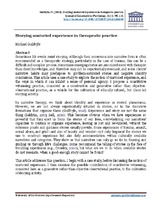Storying unstoried experience in therapeutic practice
Abstract
Sometimes life events resist storying. Although their conversion into narrative form is often recommended
as a therapeutic strategy, particularly in the case of trauma, this can be a difficult and complex
process. Sometimes emerging stories are associated more with therapist than client knowledges, and
therefore may not be experientially resonant, and some clients’ narrative habits may predispose to
problem-saturated stories and negative identity conclusions. This article uses a case study to explore
the notion of unstoried experience, and the ways in which it can inhibit a sense of personal agency.
I propose a constitutive witnessing practice, conceived as a constructive and generative rather than
objective-observational practice, as a vehicle for the cultivation of ethically infused, but client-led
storying activity.

